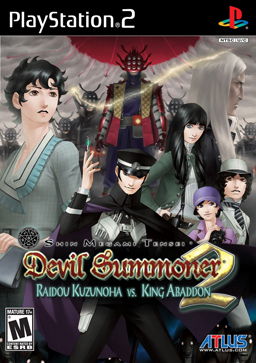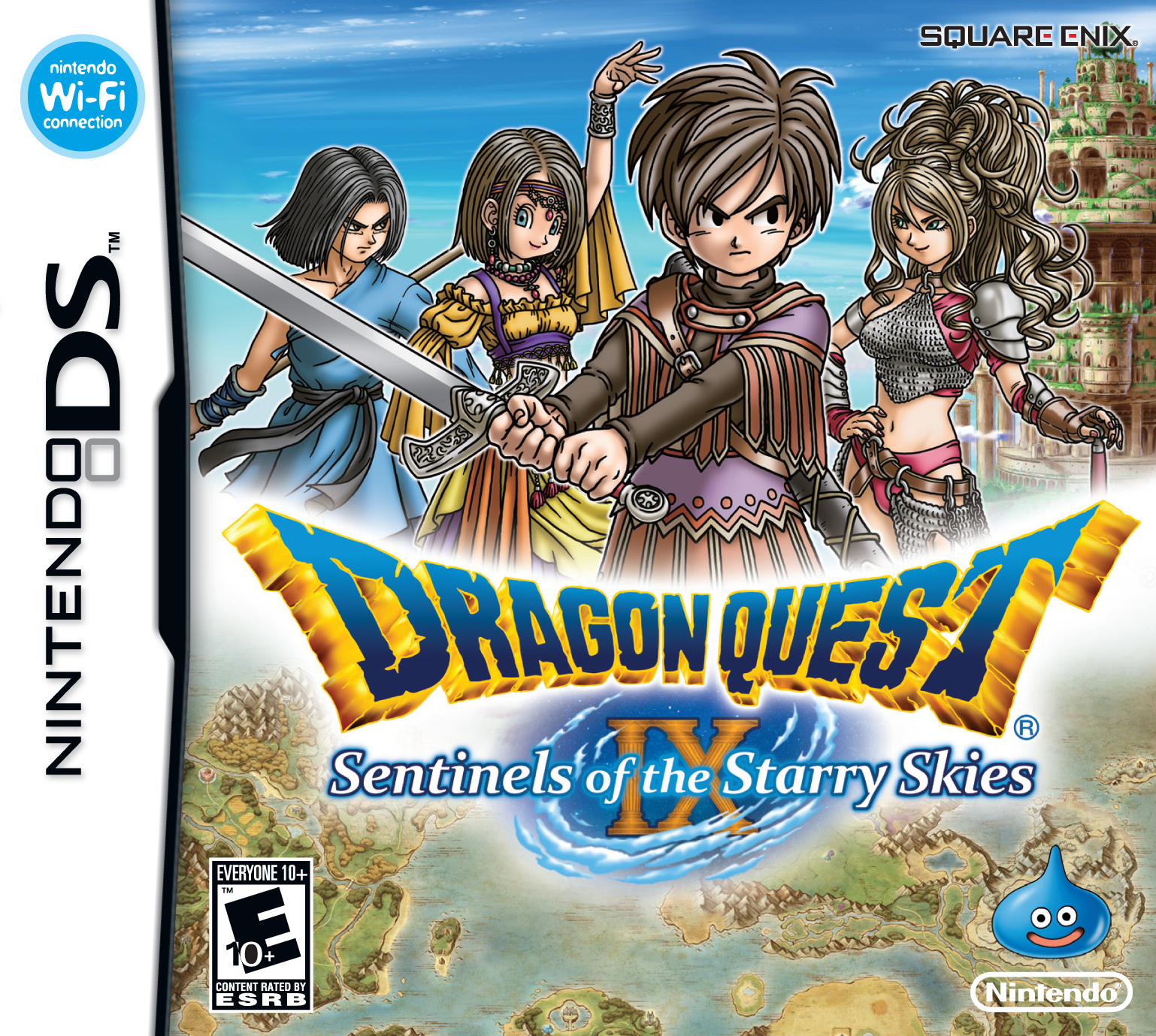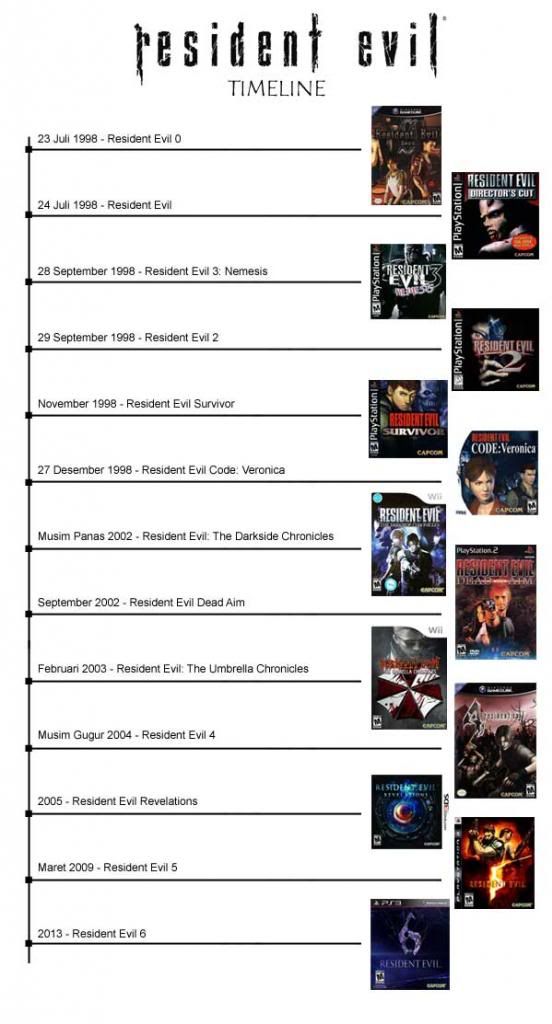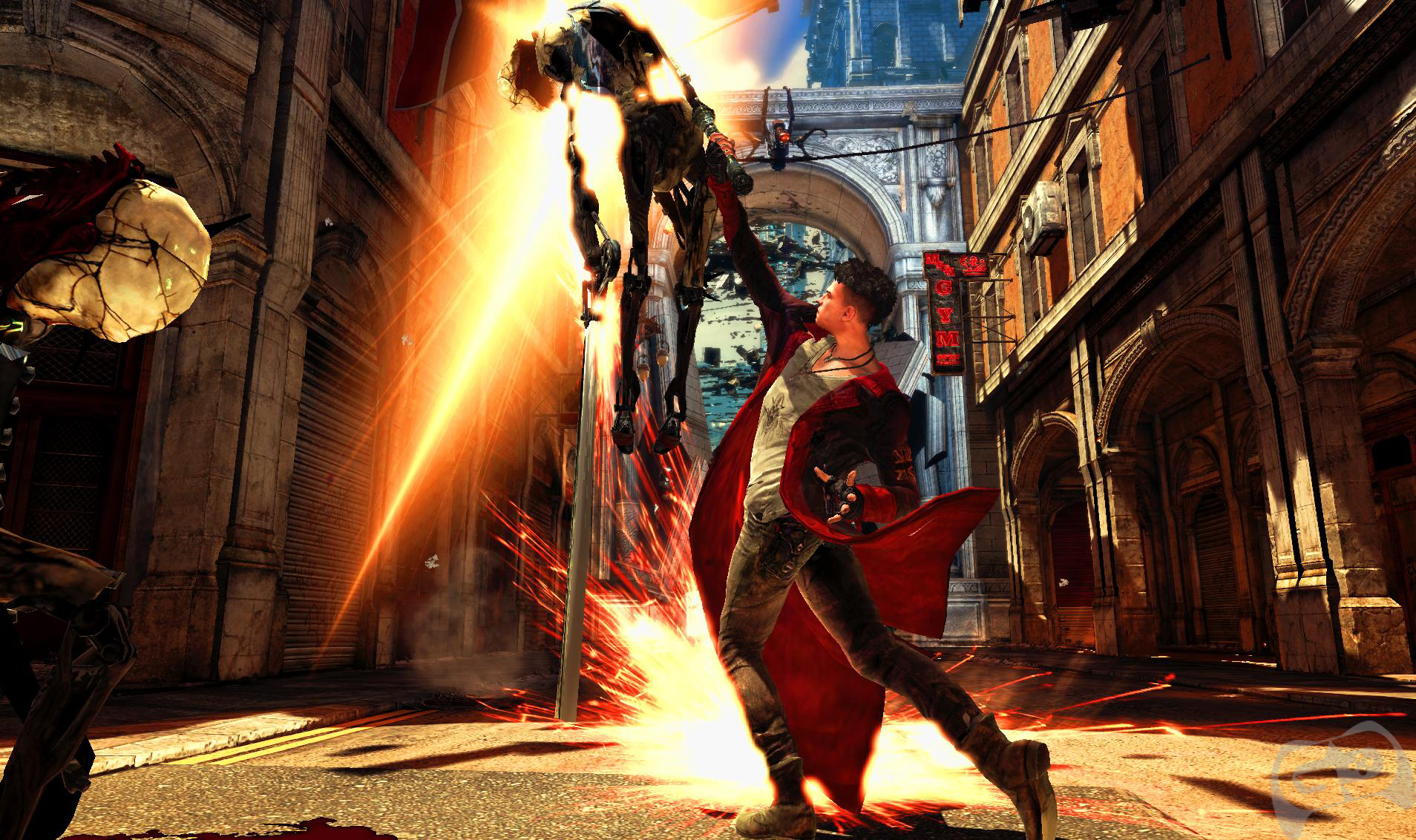One
pervading practice in the game's industry that really ticks me off is naming
schemes. Names that have numbers which
discount sequels, side stories or the like, names that are meant to be a reboot
for a series, despite it having a dozen previous entries, names of games
completely unrelated to a series...the list goes on. My big question is, why? What's in a name? If the game is something original, go for
something original. If the game is part
of a series, make sure it has its proper place either chronologically or
spiritually. Don't use a name just to
sell game. Just don't.
Because if
you try to sell a game using a name and that game isn't worthy of the name, all
the fans you'll win with the name will hate your game.
There are dozens
of good examples for this practice.
While DMC was meant to be a reboot of Devil May Cry, it probably would
have faired better with Devil May Cry fans if it wasn't given that name. While the tone of the game is darker than the
original series and the character a bit more petulant and angsty, the gameplay
is solid and enjoyable. The level design
and aesthetic are unique and the story, while a bit topical, has some
interesting nuances. However, many
people who grew up with the silver haired devil killer, Dante, and his brother,
Vergil, cried foul of the game for its drastic tonal and character shift. If the game had been called something
different like "Purgatory" or "Angels and Demons" then fans
of Devil May Cry would probably have loved the game as a wholly separate entity
from their beloved series.
 |
| Top is Devil May Cry 4, bottom is DMC. Notice the similarities and difference. |
Name value
is not brand loyalty like it was before the internet. Before the rise of the internet, people had
to rely on names to sell games. Final
Fantasy sold because it was Final Fantasy.
Now, Final Fantasy doesn't sell, not because of drastic changes to the
name, but because fans no longer have to rely on the name to see the
gameplay. They have the internet. They can choose for themselves. And with the rise of games which blatantly
gouge the players for money, like Final Fantasy: All the Bravest or three Final
Fantasy 13 games which don't feel like Final Fantasy games at all, they tend to
be more angered by the use of the name than prone to buy into it. When fans of a series see that series bastardized,
they are less likely to invest in it because it is not what they want and it
actively insults, in their minds, the accomplishments of previous entries. Bringing it back to Devil May Cray, the game DMC
was already receiving a ton of press for its visuals, combat, and because it
was being created by Ninja Theory. It
didn't need the Devil May Cry name to sell units. If anything, the name hurt sales.
And despite how utterly simple this kind of logic is, many people fail to realize that original IP CAN survive and that it doesn't need to cling to other titles. An example: Bioshock could have called itself System Shock 3, since it was clearly a spiritual sequel, but it was different enough that they went with a different name for a different premise, preserving the System Shock series for fans while introducing a new game to the public. It worked. Bioshock is getting ready to release a third game in its series this year, with no signs of stopping yet. Darksiders also received critical success even though it was an original IP. It may have borrowed heavily from the Legend of Zelda and a few other games, but it wasn't called "The Legend of War." You do not need to use someone else's name to sell a game. Bayonetta wasn't called Devil May Cry 5, even though it could have been since the combat and mythology were very similar and it's director made the first Devil May Cry. And Bayonetta was a critical darling, making a huge splash with Devil May Cry fans because of how fun and insane the game was despite it not involving their favorite devil killer. You don't need to piggyback success from other games if you have a solid product.
And despite how utterly simple this kind of logic is, many people fail to realize that original IP CAN survive and that it doesn't need to cling to other titles. An example: Bioshock could have called itself System Shock 3, since it was clearly a spiritual sequel, but it was different enough that they went with a different name for a different premise, preserving the System Shock series for fans while introducing a new game to the public. It worked. Bioshock is getting ready to release a third game in its series this year, with no signs of stopping yet. Darksiders also received critical success even though it was an original IP. It may have borrowed heavily from the Legend of Zelda and a few other games, but it wasn't called "The Legend of War." You do not need to use someone else's name to sell a game. Bayonetta wasn't called Devil May Cry 5, even though it could have been since the combat and mythology were very similar and it's director made the first Devil May Cry. And Bayonetta was a critical darling, making a huge splash with Devil May Cry fans because of how fun and insane the game was despite it not involving their favorite devil killer. You don't need to piggyback success from other games if you have a solid product.
 |
| Darksiders was an original IP with an original name that made enough money to have a sequel. Original IP CAN survive! |
More than
just original IP having the power to survive though, game companies need to be
aware of fan backlash. The game Turok is
a perfect example. People were hoping to
sell a bland, generic shooter, where the player is a space marine on a planet
of pirates and dinosaurs using the name Turok, because it had had a successful
comic run and was a cult classic on the Nintendo 64. People balked at Turok, panning it and
refusing to buy the game. The original
Turok featured a time traveling Native American who fought off dinosaurs with
alien weaponry, spiritual powers, and who dealt with aliens and it became a
cult classic, even earning a sequel on the N64.
But the Turok game released in 2009?
That game was as bland and cookie cutter as they come and earned the ire
of Turok fans for dashing their hopes of a true sequel.
 |
| Compare for yourself. This is Turok 2008. Can you tell this apart from any other generic shooter on the market? |
 |
| This is Turok: Dinosaur Hunter. Cyborg dinosaurs. Now can you understand why fans hated the 2008 game? |
Hope is one
of the cogs of the game industry that keeps it moving forward. Players hope for sequels or ports, or re-releases
of their favorite games. So much so that
they write in, phone in, petition, and go out of their way for game companies
to notice that they have interest. There
is a surge of hope every time there is a chance for a Mother game to be
released abroad, but it has yet to be realized.
The Mother fanbase is very loyal and devoted to the Mother/Earthbound
series. Now, imagine if an RPG that was
just a bland fantasy fare took on the Mother name, which grounded itself in
contemporary society with offbeat humor and a strange story? The fans would go nuts, boycotting the game
and crying foul against the company that made it. So...why is it that game companies keep using
names that will more than likely hurt their products?
Well, there
are a number of reasons, though none of them are very good. The first is the design by committee
rule. This is where a game is created
strictly by the books, an uninspired, generic, waste of space that never
attempts to challenge the player's thinking processes or their skill as a
gamer. Design by committee is not as
uncommon as it needs to be and it even goes down to a name. The committee has to decide what name will
sell, even if they know their game is utterly generic. If it's a movie licensed game, they use the
movie's name, so fans of the movie know to pick it up, even if they may not
enjoy the game once they've purchased it.
Otherwise, the committee may look at the rights they currently own and
which games might fit into the mold, regardless of their original forms. Syndicate was originally a tactical espionage
RPG set in the far future, however it was re-released as a generic first-person
shooter with only tangential connections to the original. A committee looked at what properties they
owned, slapped it on their game, and put a thin coat of paint on the surface to
disguise it as that property.
Another good reason is the
ability to hide a game's flaws from the public.
In the internet age, nothing is secret.
However, some developers have managed to keep the darker parts of their
games' pasts out of the spotlight and give off an image of confidence and
polish. An excellent example of this is
Aliens: Colonial Marines. This game was
released to abysmal scores by most, citing numerous graphical glitches,
terrible AI and story, and a lack of focus on the Aliens license. This was due to numerous delays, issues, and
developer Gearbox having to start from scratch after a developer they
outsourced it to threw out much of their work.
But, by creating an impressive E3 demo, they were able to pull off the
illusion of everything being alright. The
demo showcased the Aliens using flanking maneuvers, their environments, and
even climbing on the walls or hiding in vents to get people, showing off
dynamic AI. There were also several
powerful character moments, where the player jovially flips off one of his
marine comrades who is checking on him to see if he's alive. And what got fans most excited was the ability
to use a number of weapons, like the smart gun and power loader, from the
Aliens movie. However, few of these
promised features made it into the actual game, and those that did were
horribly butchered. However, because of
the illusion of a good game, the name was actually able to move some units
before the truth was leaked. Perhaps not
enough units, but in cases like this, some is better than none.
 |
| This is Syndicate |
 |
| This game is NAMED Syndicate, but is just another generic design by committee shooter. Fans were pissed. |
 |
| This is the Aliens: Colonial Marines demo. Yeah, that flame thrower power loader? Doesn't exist in the real game. This was just made to hide the poor production of the real thing. |
Press seems
to be the biggest reason for these name decisions. How do we take an utterly generic game and
make it stand out, both on the internet and in gaming culture? Give it a name people will recognize! This logic is horribly flawed and usually
results in fan backlash, like with Turok, however some companies don't
care. Some games are so play by numbers,
uninspired, or just plain bad that they need the press to get people to even
know their game exists. This is how
shovelware can sometimes reach some success on the market. A company knows their game is bad, but they
have to push it out to try and recoup some of their money, so they use a
license they already own to drum up press and some people will be convinced by
the media blitz to purchase the game. Or
they will just be morbidly curious as to how butchered their beloved franchise
can be. For some games and some
companies, any press, even if they cry foul of the name of your game, is
worthwhile.
One of the
saddest reasons for these naming schemes are corporate ignorance or
mandate. Often times, corporations seem
to take an almost child-like glee in showing how out of touch they are with
their consumers. Capcom's continual use
of on disc DLC or EA's online pass systems are proof of that. So, some games may be given a name from a
series or called a reboot simply because their corporate overlords say that's
how it has to be. They don't take into
account the fan reaction, or if they do they don't care, thinking the games
will sell well regardless. This is why,
in my opinion, all the decision making at a corporation, at least one involved
in game development, should offer final say on certain decisions to the
developers actually working on the product.
Maybe the corporation shouldn't create another bland Syndicate or Turok
and, instead, just let the developers name their game something unique. Even if it's bad or uninspired, it at least
no longer has to compare to the standards of much better games before it. By the standards of an original IP, maybe it
won't seem as bad and can actually have a chance, rather than being dead on
arrival.
There are
other, more minor reasons, but they all fall into the same lines. Before we wrap up, however, I just want to
encourage gamers and developers to use their brains when thinking about the
names of video games. Not just sequels
either. When it comes to sequels,
reboots, remakes, or what have you, use the resources available to you and do
research before you plonk down $60.
Maybe wait a week until after a game is released and check out videos of
it online to get an idea for story and gameplay or read a review. Use your brain. That also extends to general naming schemes
in games as well. What we haven't talked
about are some of the esoteric or bland names in video games. Fracture, Bullet Storm, Quantum Theory, Sina
Mora, Nier, and so many others use names that ultimately tell little to nothing
about their game beyond a broad, general idea.
Fracture, you can move earth or break stuff, possibly? Bullet Storm, you shoot bullets? Quantum theory...physics? Sina Mora...I don't even know. Nier...I know it's the protagonist's name but
that tells me nothing about the game.
.jpg) |
| I love Suikoden. It's a fantastic RPG series. But look at that name...does it tell you ANYTHING about the game at all? Names need to excite, not confuse players. It needs to make them WANT to play. |
Look,
naming is not as difficult as you might think.
If you're not going to use an already existing series, then think about
what your story has involved in it, what you want fans to know about it and the
best way to convey that to them in the minimal amount of effort. Shin Megami Tensei Devil Summoner 2 Raidou
Kuzunoha vs King Abbadon? That's a bit
too long. It gives a lot of information,
but really, Devil Summoner 2 would have said all it needed. You summon demons to fight for you and this
is the sequel. Try to get across a feel
for your game with the title as well as certain character details. For example, the three games from Operation
Rainfall: Xenoblade Chronicles, The Last Story, Pandora's Tower. Think about what those names tell you. Xenoblade Chronicles. It's a story that has become something of a
legend that has spiritual ties to previous games from the Xeno series and you
wield a powerful sword. The Last Story:
This game focuses heavily on story and it is of such importance that it is the
last one, meaning the last tale of a dying man, the last tale of a dying world,
or the final chapter in someone's life.
This kind of title is beautifully ambiguous, allowing the imagination to
sell the game for you. Finally,
Pandora's Tower. This immediately
invokes images of a forbidden tower which you are tasked to explore, drawing
parallels to the Greek myth of Pandora's box with the fairy tale implication of
towers as places of imprisonment that need to be surmounted by heroes. All of those titles only use two words but the
imagination of gamers sells them on only a premise. Even a simple, ambiguous title can be pretty
effective. Halo, for example. Religious warriors? Death and rebirth? God?
Halo may be a pretty bland fare, featuring space marines fighting a
religious cult of aliens, but the title invokes a number of images in one's
mind that the uninitiated might be taken in by.
And the game actually delivers on some of those images, which makes the
title appropriate and not just deceptive.
 |
| The name is a bit too on the nose...sure it tells us what the game is about, but needs to leave more to the imagination |
 |
| These game names set the imagination on fire with possibility. THIS is how naming games should be |
These kinds
of rules go for subtitles to games as well.
Numerous sequelized properties use subtitles to differentiate or whet
the appetites of gamers. Some can be
spot on, but with a bit of dramatic flair.
Dragon Quest 5: Hand of the Heavenly Bride. Immediately we know what we're getting. A Dragon Quest game and all that entails, but
now we know something about the story.
It will prominently feature marriage, perhaps not the player's but
marriage in general, it will deal with destiny or heavenly powers, and it will
involve the groom of said bride. Titles
like that set the imagination on fire.
Or how about Dead Rising 2: Off the Record. Again, you know what you're getting. Zombie killing whacky/serious fun. But the title indicates that it is non canon,
meaning it is a different take on what is already known. This can easily sell certain players.
 |
| Even with established game series, a good subtitle is worth a lot. Sentinels of the Starry Skies. That gets me pumped for what's to come. |
My point is
this. Game developers. Corporations.
Use your brains. If you're
creating a game, think about what the name you want to give it will mean and
try to tailor it to so that it captures the imaginations of gamers. A name of a character or a name of a
species...if it doesn't have flair to it, it can be the death knell of a new
property. Don't try to put an already
established name on something bland or unrelated. Gamers will notice and they will be
angry. Do not use a game's name to
entice players, then hide the fact that your product is garbage. This will only erode a gamer's faith in your
company and make them less likely to support you. And finally, don't just slap any old name
onto a game. If a game is a movie
license or a sequel, I know that sometimes there's no other option, but for an
original IP...every original IP tries to do something with what they've
got. So think about what you're trying
to do, the mood, the feelings, the desires you're trying to get across, and
incorporate that into your naming. It
will make a difference.
Gamers,
this one also goes out to you. Recognize
what a game's name might mean. The good
ones which set your imagination ablaze and the bland ones which you forget
almost as soon as you read them. And use
your resources. The internet, word of
mouth, your own eyes...don't buy into a game just because of a name. It's fine to take an interest in a game
because of the name, but it needs more than just the name supporting it.
Games
industry, put thought into what you name your games. If it's original, give it something suiting
the mood and style of the game. If it's
a sequel, a subtitle that tells us what to expect might be nice. And if it's bland and uninspired, own up to
it at least and try to make it work for you.
Don't use someone else's good name to sell a shoddy product.
In the end,
what's in a name? Quite a lot, it would
seem.





No comments:
Post a Comment